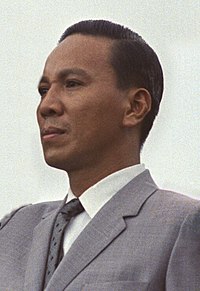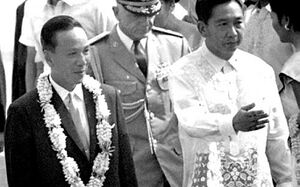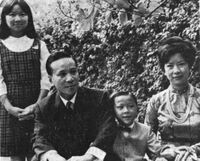Hoàng Viện Trai
This article is incomplete because it is pending further input from participants, or it is a work-in-progress by one author. Please comment on this article's talk page to share your input, comments and questions. Note: To contribute to this article, you may need to seek help from the author(s) of this page. |
Hoàng Viện Trai | |
|---|---|
| 皇院𤳇 | |
 Trai in 1968 | |
| State Director of Nainan | |
| In office 6 February 1956 – 20 December 1975 | |
| Premier | Nghiêm Nài Phúc |
| Preceded by | Position Established |
| Succeeded by | Nghiêm Nài Phúc |
| General Secretary of the Nainan People's Solidarity and Longevity | |
| In office 17 February 1955 – 20 December 1975 | |
| Preceded by | Position Established |
| Succeeded by | Nghiêm Nài Phúc |
| Personal details | |
| Born | 17 July 1916 |
| Died | 20 December 1975 (Age 59) |
| Cause of death | Gunshot wound |
| Political party | Nainan People's Solidarity and Longevity |
| Spouse | Diệp Nhã Cam |
| Children | 2 Hoàng Lan Trúc Hoàng Lan Mai |
| Alma mater | Royal University of Canhdong |
| Military service | |
| Allegiance | |
| Years of service | 1946-1953 |
| Rank | Lieutenant |
- This is a Nainese name; the family name is Hoàng (皇).
Hoàng Viện Trai (Nainese: 皇院𤳇; 17 July 1916 - 20 December 1975) was a Nainese statesman, revolutionary, politician, and military officer who was the founder and first State Director of the Harmonious Republic of Nainan, serving from the foundation in 1956, throughout the Nainese Civil War, and until his assassination in 1975. He also was the founder of the Nainan People's Solidarity and Longevity, the sole ruling party of Nainan since 1964, as well as the founder of it's central ideology, Tự Ý Chí.
Trai was born on the 17th of July, 1916, in Bao Xuyên, a farming town today located in the Ảnh Lửa Province. During the Great War his family lost much of their wealth. He would attend the local school in Bao Xuyên, where he met his future wife Diệp Nhã Cam. In the late 30s he would attend the Royal University of Canhdong, here he would study political science. He would later join the Nainese Commissariat Armed Forces, where he would reach the rank of officer.
After he left the military he became a professor at the Royal University of Canhdong, where he began to formulate his ideology, Tự Ý Chí. He became very criticizing of the government and wanted revolution, his writings began very popular amongst nationalist revolutionaries. He would eventually form his own political party, the Nainan People's Solidarity and Longevity, which quickly grew in popularity as the monarchy's stability fell. He would gain lots of military support in particular.
After a failed attempt to rid the military of revolutionaries, Trai and his military allies declared revolution and eventually toppled the monarchy. At this time the Nainan People's Republic also rebelled, and Trai's nationalist forces would face the socialists during the Nainese Civil War, his forces would eventually win. He would create the Nainese Constitution in 1965 and banned all other parties except the NPSL. He would solidify his party's control as the State Director and enact policies to rid Nainan of "foreign influence". He would also rid Nainan of socialist elements and began espionage against neighboring socialist states. Trai would become close allies with Shangea and Zorasan due to their similar political ideologies, as National Principlism, and Sattarism were considered the two main inspirations for Tự Ý Chí.
Trai would lead an authoritarian rule but also saw economic growth and strength in Nainan. He would eventually be assassinated in December 1975, when visiting a military camp in the western reaches of Nainan. He was succeeded by his Premier and right hand man Nghiêm Nài Phúc.
Early life
Trai was born in the town of Bao Xuyên into a wealthy family on 17 July 1916, his father, Hoàng Long Dai, was a retail store owner as well as union activist. His mother had worked at home. His family had become wealthy after the Great Collapse, but this changed during the Great War, his family lost much of their wealth during the war. His father was imprisoned during the war for being suspected of being a member of the Nai Tu Do, a Shangea-backed independence movement in Nainan, however he was let off.
Trai would attend the local school in Bao Xuyên and met his future wife, Diệp Nhã Cam, at the school. He would go on to attend the Royal University of Canhdong in 1935. Here he would study political science, he had wrote a thesis on the Senrian Revolution as well as the ongoing Corrective Revolution in Shangea. He later joined the Nainese Commissariat Armed Forces.
Military career
In 1941 Trai would join the Nainese Commissariat Armed Forces where the he would be stationed a base in Canhdong. During his military career he was once questioned by the government of the Nainese Commissariat on his father's union involvement. His father had been arrested again in 1942 due to his support of a strike at a plantation in Nainan and was found guilty and imprisoned, Trai represented his father during the trial but to little success. His father would be given 2 years in prison.
He would then marry his wife in 1946. Trai was able to become an officer in the Commissariat's army in 1950, and would end up as a Lieutenant in the military in 1951. He would continue to serve as a lieutenant, here he would meet Nghiêm Nài Phúc, another officer in the military who he became friends with and would later go on to found the NPSL alongside. They would discuss their political ideologies together. Trai stated once "Phúc is my best friend, without him I would've never thought up a plan for the future of our country. I consider him an equal to me when it comes to creating the revolution that created the new Nainan." In 1953 Nainan was given independence as the Kingdom of Nainan, he remained a member of the Royal Nainese Armed Forces until later that year when he left the military to become a professor.
University career
During the 1950s he would teach political science at the Royal University of Canhdong. Here he was develop most of his writings on his own future ideology, known as Tự Ý Chí, or Self-Will ideology. Here he would be greatly criticized by the conservative establishment who supported the monarchy, claiming Trai's teachings to the students was subversive and "socialist" in nature. He would write admirational letters to the leaders of Shangea and Zorasan at the time.
Trai said in his writings that he admired the socialist struggle but he would disavow council socialism as another form of Euclean imperialism, and that class struggle was not a part of Coian society and should not be the focus of the government. He also aspouted very nationalist views, stating that Nainan was not a nation-state but a "soul created by the common good of a united people."
Trai would go on to meet with his previous colleages such as Nghiêm Nài Phúc in the formation of a political party based on his ideology, they would form what became known as the Nainan People's Solidarity and Longevity, or the NPSL. Early on the party became allies with the National Principlist Nainan Front and somewhat the Nainese Section of the Workers' International, on the grounds of revolution.
Leader of NPSL
As the leader of the NPSL trai would work on allying with other parties that shared similar views and assimilating them into the NPSL to grow the party size. He was able to merge with the NPNF and other parties such as the right-leaning Revolutionary Nainese Party and the left-leaning Nai Cong.
Nainese Civil War
State Directorship
1965 Constitution
Social Policy
Economic Policy
Foreign Relations

Death
Legacy
Personal Life

In 1946 Trai married Diệp Nhã Cam, a daughter of a wealthy farm owner, she was his partner since they were in school together.
He and Cam had two children, his son Hoàng Lan Trúc in 1954 and daughter Hoàng Lan Mai in 1956. Both of them would become prominant political figures in Nainan, Mai being the current General Secretary of the Nainan People's Solidarity and Longevity.


